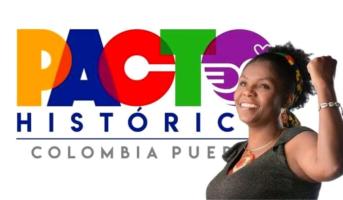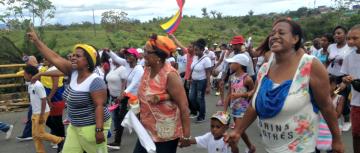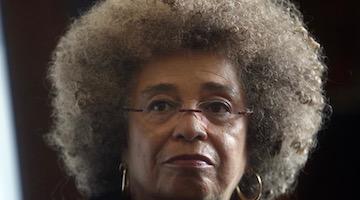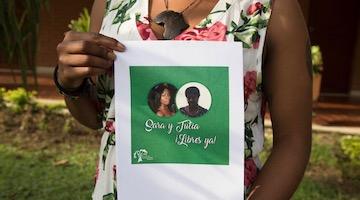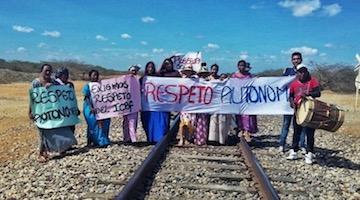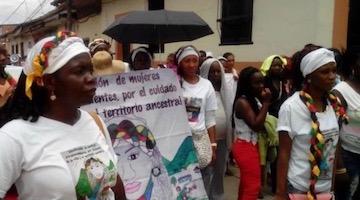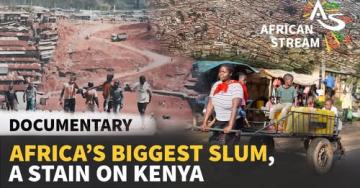In principle, the government of Colombia recognized Black people’s right to collective ownership of land back in 1993, but these rights have not been fully achieved, in practice.
“As a result of Law 70/93, the Afro-Colombian, Raizal and Palenquero Peoples have six million hectares collectively titled.”
The following remarks were delivered by Charo Mina-Rojas, of the Black Communities Process in Colombia, to the United Nations Intergovernmental Working Group for the Effective Implementation of the Durban Declaration and Plan of Action,in Geneva, Switzerland. The Durban Declaration and Plan was adopted by the UN World Conference Against Racism, Racial Discrimination, Xenophobia and Related Intolerance, in Durban, South Africa, in 2001. The Black Communities Process in Colombia (PCN, in Spanish) struggles for the collective land rights of Afro-Colombians.
Good afternoon. I bring for you a greeting from the Afro-descendant territories of Life, Joy, Peace and Freedom in Colombia. On behalf of our communities and leaders I thank you for the opportunity to be in this space to contribute, from the voices of Afro-descendant people of the Black Communities’ Process in Colombia, to the construction of the International Declaration on the Rights of Afro-Descendant Peoples.
This August 27th, the descendants of Africa in Colombia commemorated 25 years since passage of Law 70, which recognizes our territorial, political, cultural and economic rights as an ethnic people. The enactment of this law has supported some important advances for our recognition and survival as a People, although we continue to confront significant challenges in terms of justice and development, particularly those related to el Buen Vivir—Good Living—with dignity and participation, consultation and consent on decisions that affect our territorial rights.
“We continue to confront significant challenges in terms of justice and development.”
The achievement of Law 70 of 1993 in Colombiais a historic milestone in the struggles against racism, and against the exclusion and dispossession of people of African descent. It is a significant step in the process of their historical reparation, which we consider an achievement for the entire Diaspora, especially if this type of measure is promoted by the Declaration on the Rights of Afro-Descendant Peoples.
From our experience, a legislative act of a positive nature such as that of Law 70/93 offers the potential to make practical and concrete the principles of recognition, justice and development that the Decade strategy has proposed, supported by the regulatory framework of international agreements and conventions that States ratify and are obligated by, creating instruments and safeguards that the Peoples and the bodies that monitor individual and collective rights can use to hold States responsible and promote compliance.
That is why we consider it imperative that the International Declaration on the Rights of Afro-Descendant Peoples calls on States to review their national constitutions and develop with the participation of Afrodescendant people, concrete legislation that effectively recognizes and promotes their right to the exercise and protection of their cultural identity; to collective ownership of their traditional and ancestral territories; to participation; to determine and protect their physical and cultural integrity through the exercise of free, prior and informed consultation and consent; and to determine the conditions and characteristics of their ways of life, among other collective rights.
“Law 70 of 1993 is an achievement for the entire Diaspora, especially if this type of measure is promoted by the Declaration on the Rights of Afro-Descendant Peoples.”
As a result of Law 70/93, the Afro-Colombian, Raizal and Palenquero Peoples have six million hectares collectively titledand we demand from the government the collective titling of a million more, as a mechanism to protect and defend the tenure and integrity of the territories and to prevent further dispossession and plunder of our communities and environmental disasters due to mining exploitation and large-scale monocrops. We have the recognition of ethno-territorial authorities that we call Community Councils, as environmental conservation guardians of the territories. We have the right to formulate our own Planes de Buen Vivir, good living plans, which must be integrated into the national development plan and allocate specific resources for their implementation. We have attained the inclusion of legislation and programs for the appropriation of educational policy with ethnic relevance, and the recognition of the history, culture and contributions of Black people to the construction of the country, as well as achievement of spaces for political representation in Congress.
We have advanced in a process of ownership of our identity in conceptual, political, cultural and experiential terms, which since 2005 has obligated the government to include ethno-racial categories that allow self-identification in order to be counted within the national census. In addition, a law was enacted that punishes racist practices. We also have the right to free, prior and informed consultation and consent. Most recently we successfully achieved the inclusion of a Chapter that requires interpretation and implementation of the Final Peace Agreement with the FARC-EP guerrilla from an ethnic and ethnic-based-gender perspective.
“We have the right to formulate our own Planes de Buen Vivir, good living plans, which must be integrated into the national development plan and allocate specific resources for their implementation.”
All these achievements represent the political project and the project for a dignified life of several million Afro-descendants in Colombia, in conditions of freedom and sovereignty, within the framework of comprehensive historical reparation. And these have been also significant contributions to the construction and understanding of Colombian society, recognized in its pluri-ethnic and multicultural character in its 1991 Constitution. Our steps have served as an incentive to the sisters and brothers in Ecuador, Honduras, Peru, and Mexico.
However, it cannot be forgotten that these achievements are also part of a burdensome path where discrimination, exclusion, expropriation, internal displacement, exile and genocide have been a constant and still continue to be a challenge for full recognition, effective justice and full development as Peoples. Hence, the Declaration constitutes another great aspiration, along with the Durban Declaration and Plan of Action, understanding that it will have to confront States’ resistance to dismantling racism, destructive capitalist economic policies, militarization of ancestral and traditional territories and the intersecting racist and patriarchal relations that have transformed the places and values of Afro-descendant women in all aspects of community life, generating dispossession of their knowledge and practices, multiple forms of stigmatization and
discrimination, and multiple forms of violence still not yet properly recognized and quantified for the purposes of a processes of recognition, justice, development, and integral historical reparation.
“Discrimination, exclusion, expropriation, internal displacement, exile and genocide have been a constant and still continue to be a challenge.”
The recognition of Afro-descendant peoples cannot occur without effective mechanisms to confront these challenges, through recognition of their territorial and environmental rights. We are interested in highlighting in particular the importance of the recognition of the right to collective property over land and territory as an important factor in the intention to close the enormous gaps that keep Afro-descendant peoples in critical conditions of vulnerability that in many cases border on humanitarian crises, and as an important instrument to exercise authority and sovereignty to achieve stability as a Ethnic People.
Starting from Durban, and in ILO Convention 169, in the United Nations Declaration of Human Rights, in the Convention for the Elimination of All Forms of Racial Discrimination-CERD, the International Covenant on Economic, Social and Cultural Rights, it has been clear that States’ provision of the conditions that would allow sustainable economies and social development compatible with our characteristics, cultural practices, interests and aspirations for Good Living, will be impossible without the recognition of the right to property on land with guarantees for its sustainable use and conditions to reproduce life, our traditional practices, beliefs and knowledge, the construction of community and in general the development of our existing with dignity, based on our subsistence and survival as peoples. These are all effective ways to combat the factors that, in almost five centuries of uprooting, discrimination and exclusion, have prevented Afro-descendant people from being recognized and treated equally and fairly.
“The titling and restitution of territorial rights of Afrodescendant peoples are imperative.”
Within a framework of comprehensive reparations, measures and concrete policies of recognition, justice and development,the titling and restitution of territorial rights of Afrodescendantpeoples are imperative.The right to property over occupied territories, and restitution over territories stripped and expropriated via the various historical forms that have characterized colonialism and coloniality, must be fundamental and essential in an international declaration on the rights of Afro-descendant peoples. The commitment of the States must be reflected in measures and legislative reforms that fully recognize the value and importance that Afrodescendants place in the land, not for its marketable, exploitable material value, but for its cultural and spiritual value where different animal beings, minerals, and plants are connected and seek harmonious ways of subsisting to guarantee sustainability of all forms of life.
CERD has already made this call to the States in 1997 in the case of Indigenous peoples and ILO Convention 169 does as well in articles 14 and 15. It is obvious that legislation by itself is not enough.Monitoring mechanisms and instruments that reinforce States’ obligation to comply are required. An affirmative legislative action such as Law 70 of 1993 can be an effective instrument of monitoring and measurement, both for the peoples and for the UN instruments and bodies -- even for the States themselves -- in the implementation of this Declaration and the Durban Action Plan.
“The right to property over occupied territories must be fundamental and essential in an international declaration on the rights of Afro-descendant peoples.”
If we’d had a Declaration 20 years ago like the one we are seeking now, it might have been easier for us to prevent the regression of rights caused by the Colombian State’s failure to create a full regulatory framework for Law 70/93, one of the most progressive mechanisms for the rights of Afro-descendant peoples. The Declaration would be strengthening the reach that CERD, EPU and CEDAW can have in their evaluations and recommendations with respect to the fulfillment and development of legislative proposals of this nature.
From our experience, recognition, justice and development – which for us mean Good Living – become concrete when they are defined by the force of Law. As we say in our communities, "territory is life and life is impossible without territory."
Thank you very much.
Charo Mina Rojas
Black Communities’ Process in Colombia – PCN
COMMENTS?
Please join the conversation on Black Agenda Report's Facebook page at http://facebook.com/blackagendareport
Or, you can comment by emailing us at comments@blackagendareport.com

